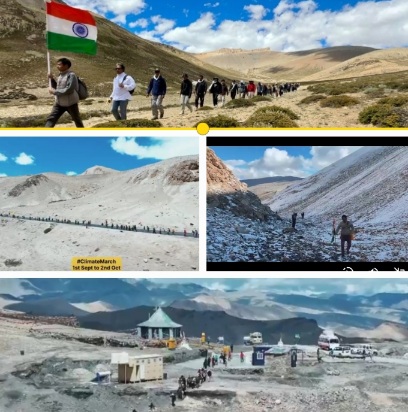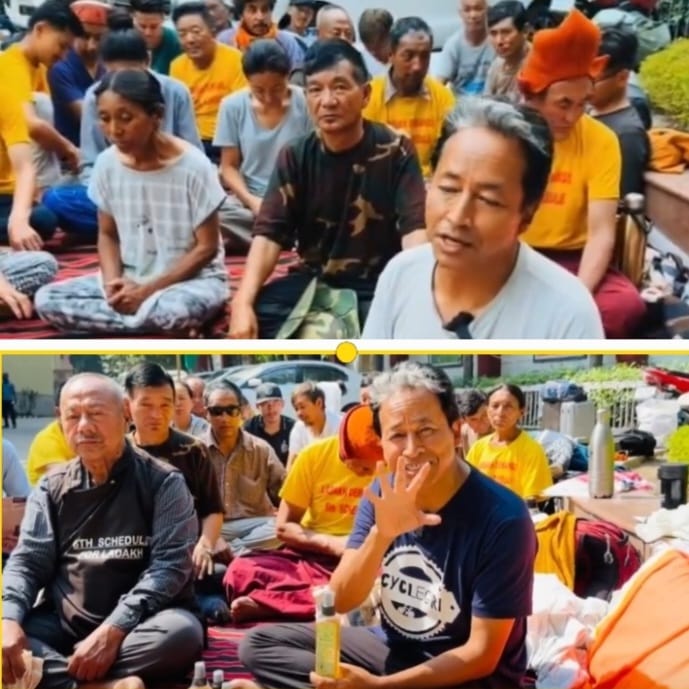SHIMLA/NEW DELHI/LEH: Sonam Wangchuk doesn’t claim to have all the answers, but his fast unto death has certainly sparked questions that India can no longer afford to ignore.
He has been trying the climate March, Climate fast, Pushmina March and the latest 1000 km long Leh-Delhi Padyatra. But he did not get big response from big parties.
No National Leader met with him as he has been on Fast unto death for the last 8 days in the premises of Ladakh Bhawan and was under detention ever since he entered Delhi at Singhu Border.
As his protest enters an uncertain destiny on its eighth day, Wangchuk’s demands for Ladakh’s protection under the Sixth Schedule have opened a Pandora’s box of debates.

Will the Modi government which abrogated Article 370 for Jammu and Kashmir and Ladakh and broke them into two UTs, grant special protection to Ladakh?
If it is answered in his favor—would it not trigger a chain reaction across other sensitive regions in India, from the Himalayas to Naxal-hit areas, question analysts.
Even as Save Lahaul-Spiti Society of Himachal Pradesh has pledged its support to Wangchuk. But turn of events in Ladakh Bhawan in Delhi has rattled many Ladakhis.
"Sixty-one volunteers, peacefully observing a "Moun Vrat" (silent fast) on Ekadashi outside Ladakh Bhawan, were forcibly detained by the police under prohibitory orders".
"Their only "crime" was supporting Wangchuk’s call to protect Ladakh’s fragile ecology and unique cultural heritage", he said.
The police cited Section 163, a measure seemingly always in place these days, as the reason for their detentions.
But this has only intensified the debate—are peaceful protestors no longer allowed to exercise their constitutional rights under Article 19? Are we witnessing democracy in action, or a crackdown on free expression?
Ladakhis protestors and their supporters raise these questions on social media.
Speaking out after the detentions, Wangchuk expressed his dismay, saying, "Is this the India we’ve been celebrating for its democratic values?
"My supporters were peacefully fasting, not causing any disturbance, yet they were lifted without any warning. And the worst part—mainstream media is conveniently ignoring it. Is this what Ladakh deserves, to be silenced and sidelined?"
Wangchuk’s fast, driven by his plea to safeguard Ladakh’s glaciers from rampant development, has ignited fierce debates across the country.
His supporters, rallying behind him with hashtags like **#SaveLadakh** and **#SaveHimalayas**, insist that Ladakh's delicate ecosystem needs special protection.
They point to the 2019 BJP manifesto, where these safeguards were promised but dropped in 2024.
Meanwhile, critics are quick to dismiss his movement as impractical, even going so far as to label him anti-national, accusing him of working to destabilize a sensitive border region.
Some fear that Wangchuk’s success could embolden other regions with similar demands. If Ladakh is granted special protections, will Jammu & Kashmir follow?
What about other parts of the Northeast or Naxal-affected areas of central India? How far can we stretch the Sixth Schedule before the idea of a united India begins to crack at the seams?
Wangchuk’s critics also argue that Ladakh, despite its fragile environment, cannot be treated as an isolated “island” under perpetual protection.
The entire world is grappling with climate change, from the Andes to the Alps and Himalayas, as glaciers retreat and new ecosystems emerge.
Why should Ladakh be any different? Why shouldn’t its people have the right to choose development and modernization if they wish to?
After all, every Ladakhi household relies on external resources—from photovoltaic panels to modern machinery—just like any other region in India.
This is where Wangchuk’s struggle gets complicated. While his cause may seem noble, some accuse him of being self-righteous, claiming that no one understands Ladakh better than him.
He’s been vocal about his belief that he alone holds the solution to tackling climate change in the Himalayas, dismissing voices that advocate a more balanced approach to development and preservation.
It’s undeniable that Ladakh’s ecosystem is sensitive, and Wangchuk’s demand for its protection under the Sixth Schedule has merit.
But at the same time, this approach raises uncomfortable questions. Can we truly set Ladakh apart as a protected preserve without creating a ripple effect across other regions in India?
Wouldn’t other states or regions—whether in the Himalayas, the Northeast, or even central India—demand similar treatment?
As Wangchuk continues his fast, his supporters are gearing up for a legal battle as Wangchuk has not got support from the big leaders so far.
There’s talk of filing a writ petition in the Delhi High Court or Supreme Court to challenge the detentions and the prohibitory orders.
But even if they win in court, will they win the larger fight?
Will the Modi government, which has remained silent so far, engage with Wangchuk and his supporters, or will this movement be left to wither away in the annals of protest history?
The broader implications of this struggle can’t be ignored. If Wangchuk’s demand for Sixth Schedule protection is granted, it could set a precedent for other regions with unique cultural or ecological concerns.
But where do we draw the line between safeguarding regional interests and maintaining national unity?
And how do we balance the urgent need for environmental conservation with the equally pressing need for development and protection of our strategic borders?
As India approaches its centenary in 2047, these questions will only grow louder.
For now, Sonam Wangchuk’s 'fight' is heading for its vortex. Whether or not the government listens remains to be seen, but one thing is certain—his protest has started a debate that will not be easily silenced or answered.




